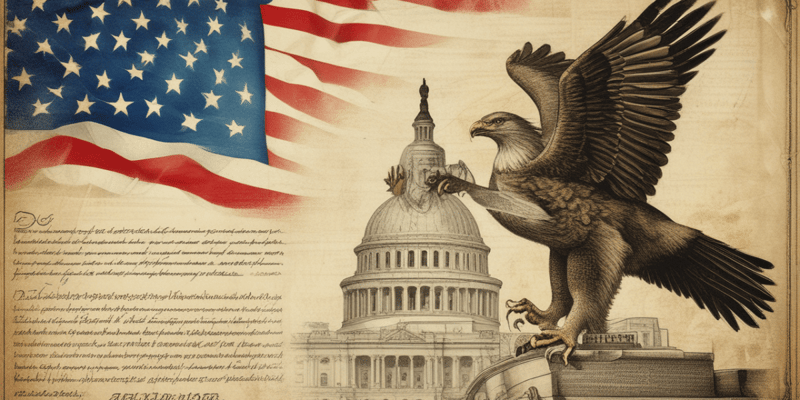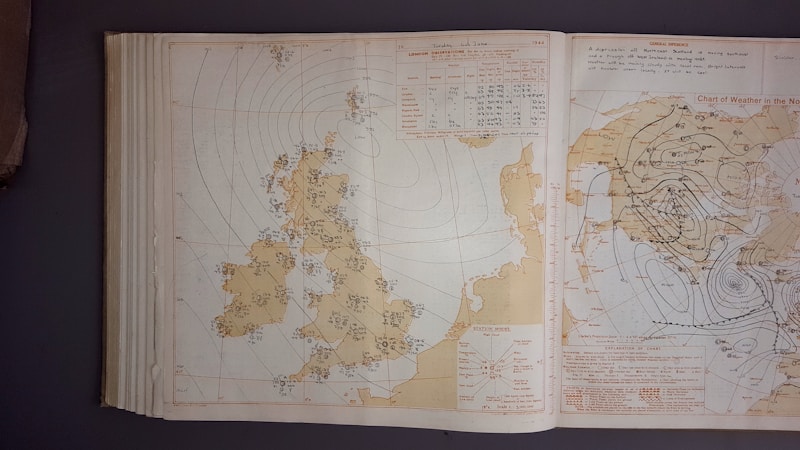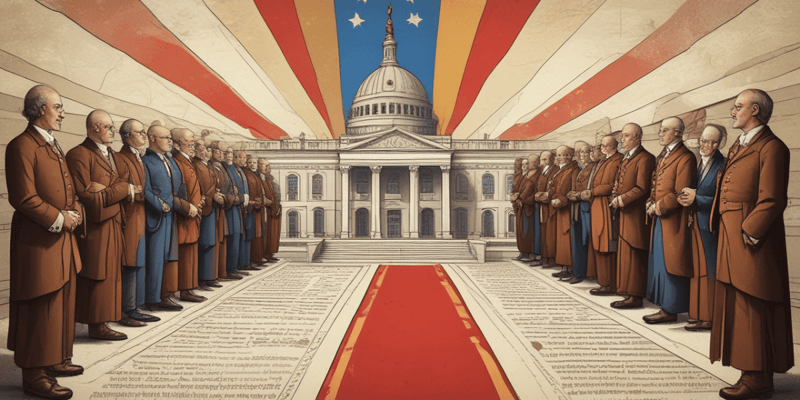39 Questions
According to James Madison, why did he consider a bill of rights unnecessary in the proposed Constitution?
Madison believed that by enumerating particular exceptions to the grant of power, it would disparage those rights not listed and imply that unlisted rights were assigned to the general government.
What did Alexander Hamilton argue against the inclusion of a bill of rights in the Constitution?
Hamilton argued that it would be unnecessary and even dangerous to declare restrictions on things that Congress already lacked the power to do.
How did James Madison propose to counter the danger of disparaging unlisted rights in the Constitution?
Madison proposed the Ninth Amendment, which states that the enumeration of certain rights should not deny or disparage others retained by the people.
What is the main concern raised about transforming the government into a democracy?
The concern is that majority rule in a democracy can confer legitimacy on acts that may be tyrannical.
In what way do liberty and democracy differ, according to the text?
Liberty and democracy are not synonymous; they could actually be opposites.
How do most Americans and political leaders today view the role of Congress, as mentioned in the text?
Most Americans and political leaders believe that Congress should do anything it can muster a majority vote to do.
What negative phrases did the framers use in reference to Congress throughout the first ten amendments to the Constitution?
Shall not abridge, infringe, deny, disparage, shall not be violated, nor be denied
How did the framers ensure government accountability in a republican form of government?
By subjecting all citizens, including government officials, to the same laws.
What is the key difference between a republic and a democracy according to the text?
In a republic, government power is limited and decentralized through checks and balances, while in a democracy, the majority rules and laws represent power.
Why did the framers include the Electoral College in presidential elections?
To prevent large, heavily populated states from dominating small, sparsely populated states.
What is required to propose and ratify an amendment to the Constitution?
A two-thirds vote of both houses of Congress or two-thirds of state legislatures to propose, and three-fourths of state legislatures to ratify.
Explain how having a bicameral Congress acts as an obstacle to majority rule.
It allows 51 senators to block the wishes of 435 representatives and 49 senators.
What is the purpose of giving the president a veto power?
To thwart the power of all 535 members of Congress.
How did the framers view democracy based on the quotes provided in the text?
The founders had disdain for democracy, viewing it as leading to tyranny and chaos.
Why did the framers consider democracy to be prone to tyranny?
Due to the potential for sacrificing the weaker party or individual in a majority-rule system.
Why do most Americans see their liberties as protected by the Constitution's Bill of Rights?
Because the Bill of Rights enshrines individual rights and limits government power.
What form of government is emphasized in the founding documents of the United States?
Republican form of government
What does the pledge of allegiance in the United States refer to?
The republic
What is the main difference between a republican and a democratic form of government?
In a republic, government is a protector of rights, not a grantor of rights.
Which key figure mentioned in the text stated that individuals have rights that cannot be repealed or restrained by human laws?
John Adams
What important phrase is missing from the Declaration of Independence and the Constitution?
Democracy
What does Article IV, Section 4 of the Constitution guarantee to every State in the Union?
A Republican Form of Government
Match the following terms with their correct description:
Democracy = Form of government where power is held by the people directly or through elected representatives Republic = Form of government where the country is considered a public matter, not the private concern or property of the rulers Constitution = Document that outlines the fundamental principles and laws of a nation Government = System or group of people governing an organized community, often a state
Match the following historical figures with their relevant statement in the text:
John Adams = "You have rights antecedent to all earthly governments; rights that cannot be repealed or restrained by human laws; rights derived from the Great Legislator of the Universe." Alexander Hamilton = "The United States shall guarantee to every State in this Union a Republican Form of Government." James Madison = "Rights that cannot be repealed or restrained by human laws; rights derived from the Great Legislator of the Universe." Walter Williams = "So what is the difference between republican and democratic forms of government?"
Match the following terms with their correct interpretation:
Rights = Inherent entitlements that cannot be taken away by human laws Laws = Rules enforced by a governing authority to maintain order and regulate behavior Pledge of Allegiance = Oath of loyalty to the republic and its principles, not to democracy Bill of Rights = List of individual rights protected from government interference
Match the following concepts with their corresponding document:
Democracy = Not mentioned in the Declaration of Independence or the Constitution Republic = Guaranteed by Article IV, Section 4 of the Constitution Great Legislator of the Universe = Source from which pre-existing rights are derived according to John Adams Veto Power = Authority given to the president to reject legislation passed by Congress
Match the following phrases with their correct historical context:
Battle Hymn of the Republic = Song associated with the War of 1861, not a democracy The Founders' Vision = "The United States shall guarantee to every State in this Union a Republican Form of Government." The Pledge of Allegiance = "...to ‘the republic for which it stands.’" Earthly Governments = "You have rights antecedent to all earthly governments."
Match the following terms with their appropriate role in government:
Protector of Rights = Function envisioned for government in relation to individual liberties Grantor of Rights = Role explicitly denied to government in the Constitution Elected Representatives = Individuals through whom power is exercised in a democratic system The Flag = "...to ‘the republic for which it stands.’"
Match the following quotes with the respective founding father:
"In tracing these evils to their origin every man had found it in the turbulence and follies of democracy." = Edmund Randolph "Remember, democracy never lasts long. It soon wastes, exhausts, and murders itself. There was never a democracy yet that did not commit suicide." = John Adams "Between a balanced republic and a democracy, the difference is like that between order and chaos." = Chief Justice John Marshall "There is nothing to check the inducement to sacrifice the weaker party or the obnoxious individual." = James Madison
Match the following individuals with their views on the necessity of a bill of rights in the proposed Constitution:
Alexander Hamilton = Questioned the need for restrictions when there is no power to act James Madison = Proposed the Ninth Amendment to protect unenumerated rights
Match the following terms with their corresponding meanings as discussed in the text:
Republic = System that the Founders intended for the U.S. with ground rules for limited government Democracy = Transformation that many Americans believe has occurred in the U.S.
Match the following key concepts with their descriptions:
Rule of law = All citizens, including government officials, are accountable to the same laws. Checks and balances = Government power is limited and decentralized through a system of checks and balances. Majority rule = Laws do not represent reason. They represent power. Republic vs. Democracy = Rights in a democracy are seen as privileges and permissions that are granted by government.
Match the following concepts with their implications as discussed in the text:
Majority rule = Confers legitimacy on potentially tyrannical acts Liberty = Not synonymous with democracy and can be opposite Ninth Amendment = Declared to protect unenumerated rights Bill of Rights = Feared to disparage unlisted rights if included in the Constitution
Match the following statements with their corresponding mechanisms in the U.S. Constitution:
Two-thirds vote of both houses of Congress to propose an amendment = Amending the Constitution President's veto power to thwart Congress = Checks and balances Bicameral Congress placing obstacle to majority rule = Legislative branch structure Electoral College preventing large states from overpowering small states = Presidential elections
Match the following terms with their philosophical implications:
Liberties in a republic = Individuals have rights that cannot be repealed or restrained by human laws. Rights in a democracy = Privileges granted by government and can be rescinded by government. Tyranny of majority rule = Day-to-day choices subjected to democratic process of majority rule. Government intervention in civil society = Protecting citizens against force and fraud.
Match the following statements with their corresponding figures who expressed them:
Founders' vision betrayed by Americans becoming a democracy = Predicted outcome by an unspecified author Majority rule confers legitimacy on acts that may be tyrannical = Assertion made by an unspecified author Transformation into a democracy disappointing to Founders = Guaranteed sentiment expressed by an unspecified author Liberty and democracy not synonymous, could be opposites = View expressed in the text
Match the following historical figures with their views on democracy:
Disdain for democracy at Constitutional Convention = Edmund Randolph Concern about sacrificing weaker party in democracy = James Madison Warning about democracy committing suicide = John Adams Comparison between republic and democracy = Chief Justice John Marshall
Match the following clauses with their references as discussed in the text:
The enumeration in the Constitution, of certain rights, shall not be construed to deny or disparage others retained by the people. = Ninth Amendment content By enumerating particular exceptions to the grant of power, it would disparage those rights which were not placed in that enumeration. = James Madison's concern Why declare that things shall not be done which there is no power to do? = Question posed by Alexander Hamilton It appears that most Americans...believe that Congress should do anything it can muster a majority vote to do. = Transformation into a democracy
Match the following key ideas with their explanations as discussed in the text:
Aura of legitimacy conferred by majority rule on acts = Dangerous effect highlighted in the text Difference between liberty and democracy = 'Liberty and democracy are not synonymous and could actually be opposites' Founders' vision versus current state of government = 'I guarantee you that the Founders would be deeply disappointed by our betrayal of their vision.' Purpose of Ninth Amendment according to James Madison = 'The enumeration...shall not be construed to deny or disparage others retained by the people.'
Test your knowledge on the founding documents of the United States and whether they establish a democracy. Explore the concept of democracy and government vision of the Founding Fathers.
Make Your Own Quizzes and Flashcards
Convert your notes into interactive study material.
Get started for free




